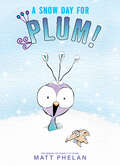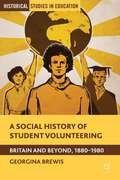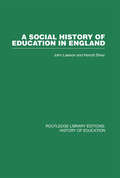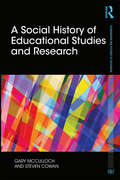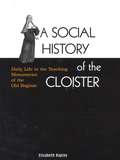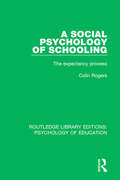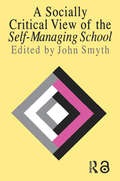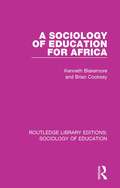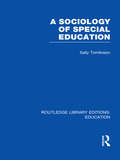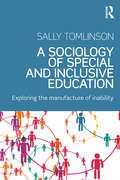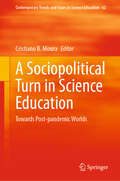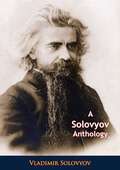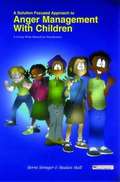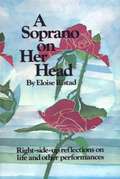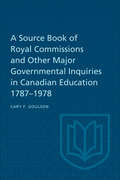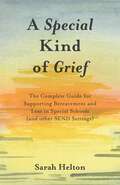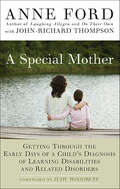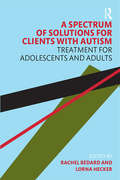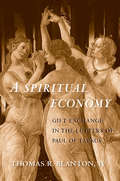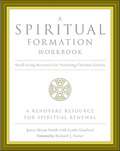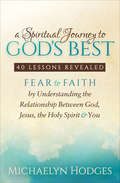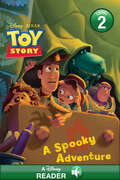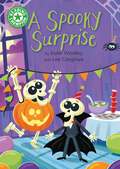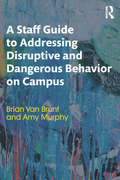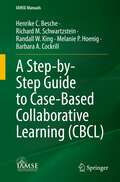- Table View
- List View
A Snow Day for Plum!
by Matt PhelanThe animals of the Athensville Zoo are thrilled to be visiting a local school to star in a presentation—everyone except for a very nervous peacock named Plum. And then an unexpected blizzard strands the animals at the elementary school overnight—yikes! From award-winning author Matt Phelan, creator of Knights vs. Dinosaurs and its two sequels, this companion to Leave It to Plum! is a highly illustrated young middle grade novel perfect for reluctant readers and animal lovers everywhere. The animals of the Athensville Zoo are going to school! Lizzie the zookeeper has Plum the peacock and his friends loaded in the zoo van to travel to a nearby elementary school to give a presentation. Most of the animals are excited—especially Itch, who has always wanted to share his knowledge with the world. But Plum is nervous. What if he doesn’t like school? What if the students don’t like him? What if he messes up the whole presentation?Then an unexpected blizzard derails the whole trip, and Plum and his friends have to stay overnight in the empty school. They’ll meet new friends, such as the classroom mice who rule the school, and the wise old turtle who supervises the library. And when Itch gets himself into a whole snowdrift of trouble, Plum overcomes his nerves to save the day!With short chapters and humorous black-and-white art throughout, award-winning author-artist Matt Phelan’s young middle grade novels about bighearted Plum the peacock and the Athensville Zoo are just right for newly independent readers. The Plum books are fun and funny adventures that tackle relatable emotional themes such as performance anxiety and being a good friend. A Snow Day for Plum! continues the hilarious adventures of the young peacock with a big heart and the small mammal with a big ego. A Snow Day for Plum! is perfect for fans of the Princess in Black and the Mercy Watson series.
A Social History Of Student Volunteering
by Georgina BrewisGeorgina Brewis takes a long view of the experience of going to university in Britain over a hundred year period. She explores students' extra-curricular volunteering, fundraising, campaigning and protest activities in Britain and beyond to show that voluntary action was central to the emergence of a distinct student movement. Brewis also considers the evolution of volunteering since the late nineteenth century through study of students' activities and argues that the universities made significant contributions to causes and campaigns ranging from educational reconstruction in 1920s Europe, relief for victims of fascism in the 1930s, and international development in the 1960s. The book draws on rich historical sources and a wider range of student testimony than any earlier study to tell the fascinating story of how ordinary women and men students engaged with the pressing social and international problems of the twentieth century.
A Social History of Education in England
by John Lawson Harold SilverOriginally published in 1973,this book describes the medieval origins of the British education system, and the transformations successive historical events – such as the Reformation, the Civil War and the Industrial Revolution – have wrought on it. It examines the effect on the educational pattern of such major cultural upheavals as the Renaissance; it looks at the different parts played by church and state, and the influence of new social and educational philosophies.
A Social History of Educational Studies and Research: Past, Present – and Future? (Foundations and Futures of Education)
by Steven Cowan Gary McCullochA Social History of Educational Studies and Research examines the development of the study of education in the UK in its broader educational, social and political context since its early beginnings in the first part of the twentieth century. By providing a historical analysis of the contested growth of the field this book examines the significant contribution that has been made by institutions of higher education, journals, text books, conferences, centres, and academic societies. It discusses the problems and opportunities of the field, and its prospects for survival and adaptation to current changes in the decades ahead. The work draws on documentary sources, social network analysis, and interviews with leading figures from across the field. This book highlights international influences on the development of educational studies and research in the UK, its role in the growing internationalisation of the field as a whole, and also comparisons and contrasts with the nature of the field elsewhere. It relates the development to the wider social, political and economic changes affecting higher education in general and educational studies and research in particular. It addresses the historical development of disciplines in higher education institutions and the nature, extent and limitations of interdisciplinarity. A Social History of Educational Studies and Research discuss the problems and opportunities facing the study of education today, and its prospects of adapting to changes in the decades ahead. It is a distinctive and original analysis of educational studies and research that provides the first comprehensive study of its type.
A Social History of the Cloister: Daily Life in the Teaching Monasteries of the Old Regime (McGill-Queen's Studies in the History of Religion #43)
by Elizabeth RapleyIn The Social History of the Cloister Elizabeth Rapley goes beyond the monastic rulebooks, legal and notarial records, and memoirs of famous women who passed through monastery doors to the chronicles, letters, and other little-known writings produced by nuns for and about themselves. Working from these accounts, Rapley is able to provide a far more complex picture of women who, as a whole, were much less otherworldly than the older convent literature would have us believe, much less thwarted and unhappy than their detractors have long maintained, and much less irrelevant than some historians have assumed. She chips away at the dehumanizing stereotypes that have often been used to describe these nuns to show the essential humanity of these women.
A Social Psychology of Schooling: The Expectancy Process (Routledge Library Editions: Psychology of Education)
by Colin RogersIf a theory of education is to be helpful to the practising teacher, it must take the social context of learning into account. Originally published in 1982, Colin Rogers does just this, exploring the implications of two decades’ detailed research in to the social psychology of teaching and learning. The central theme that emerges from this study is the importance of the still controversial ‘teacher-expectancy effect’ – the effect of teachers’ expectations on the performance of pupils. By examining in detail the claims made by those who believe that the expectations of teachers can influence levels of pupils’ academic attainment, the book shows the complexity of interpersonal interaction and perception within the classroom and the nature of problems involved in studying these. It also focuses on the way that the mutual perceptions of teachers and pupils themselves affect, and are affected by, other aspects of life in a school; and extensive use is made of research conducted in British schools to illustrate major points. The conclusion of the study was that it is the classroom – the very environment in which teachers and pupils interact – rather than teacher training that may need reform.
A Socially Critical View Of The Self-Managing School
by John SmythThe shift from the model of central government educational control to school- based management has been widely adopted and acclaimed and has created the general impression of increased democracy and participation.; The international contributors to this book tackle this important policy issue and look behind the scenes of the moves towards school self- management. They investigate the phenomenon of the self-managing school, Why It Is Happening Now, What Is The Truth Behind This Notion And The problems which lie behind devolution and self-management.; The self- managing school, it is claimed is not about "grassroots democracy" or "parent participation" but absolutely the reverse and this contradiction is best understood in terms of the ideology of the New Right. Enlightened and informed perspectives of the reality behind school self-management suggest that the devolution of power is only superficial. Hierarchies continue to exist as unequally funded schools which perpetuate class, gender and ethnic divisions. The mechanism involved promotes the Survivial Of The Fittest Through Notions Of Choice.; For Those Involved in school management and education generally, this book should provide a useful insight into the struggle surrounding the control of schooling.
A Sociology of Education for Africa (Routledge Library Editions: Sociology of Education #8)
by Kenneth Blakemore Brian CookseyThis book, first published in 1980, provides a summary of the major research findings of previous studies of the sociology of education in Sub-Saharan Africa within an original and stimulating general framework whilst also devoting space to their own research findings. The major themes of the book are education and social inequality, the sociology of the school, the teacher and the curriculum, and education and development. The student of the sociology of development will find a stimulating discussion of education in relation to socio-cultural, economic and political change in contemporary Africa.
A Sociology of Special Education (Routledge Library Editions: Education)
by Sally TomlinsonAt the time of original publication, special education in Britain was permeated by an ideology of benevolent humanitarianism and this is ostensibly the moral framework within which the professionals – teachers, educational psychologists, medical officers – operate. The author widens the debate about special education by introducing sociological perspectives and considering the structural relationships that are produced both within the system and in the wider society when part of a mass education system develops separately, as ‘special’ rather than normal. She outlines the origin and development of special education, stressing the conflicts involved and the role played by vested interests, and criticizes the current rhetoric of ‘special needs’. Among the issues and dilemmas that she identifies, the problems of selection, assessment, integration and the curriculum for special schools are discussed in details, and the position of parents, pupils and teachers within the system is examined. The author gives particular attention in a separate chapter to the problems and position of ethnic minorities.
A Sociology of Special and Inclusive Education: Exploring the manufacture of inability
by Sally TomlinsonA Sociology of Special and Inclusive Education brings sociological perspectives to bear on the social, political and economic policies and practices that comprise special and inclusive education, and the education of lower attainers. Increasingly governments have accepted the premise that education should incorporate all social and ethnic groups, especially those regarded as having special educational needs, disabilities and difficulties in learning, but despite a plethora of literature on special and inclusive education world-wide, governments are still unsure of the reasons for this sector’s expansion in their national education systems. Professor Tomlinson applies critical sociological perspectives to the social processes, policies and practices that comprise special and inclusive education, particularly in England and the USA. She clearly examines the way in which people or groups exercise power and influence to shape this area of education, and discusses the conflicts of interest that arise in resulting social interactions and relationships. Key questions asked include: Why and how has a whole sector of education dealing with young people regarded as having learning difficulties, low attainments, behaviour problems or disabilities developed? How have special education programmes and resources become subsumed into variations of inclusive education? Why have ideological beliefs in hierarchies of ability, limits to learning potential and IQ as measurement continued to legitimate the treatment of young people? What happens to young people after their special, included or lower attainers' programmes, in terms of work and life chances? A Sociology of Special and Inclusive Education will be of interest to a wide range of educators, professionals, practitioners and policy-makers concerned with special, inclusive and vocational education, in addition to undergraduate, post-graduate and research students and academics.
A Sociopolitical Turn in Science Education: Towards Post-pandemic Worlds (Contemporary Trends and Issues in Science Education #62)
by Cristiano B. MouraThis edited volume features a collection of essays on the COVID-19 pandemic and associated crises and its implications for science education research and practice from a socio-political perspective. Taking the pandemic as a starting point – and understanding the pandemic as an event that exposes science-society relationships in their complexities –, this book sets provocations for the science education community, analyzing aspects of its practices, conceptualizations, aims, core values, research traditions, institutions, affectivities, and aesthetics from diverse points of view, and proposing new postures for the future of science education. Some central themes to science education research such as the concepts of scientific literacy and nature of science (among others) are revisited, and new perspectives related to affects, multiculturalism and the knowledge-power relationships are explored. This book brings together authors from diverse backgrounds, geographic origins, and academic trajectories, composing a truly international volume with a plurality of voices weaving a rich caleidoscope seeking to analyze science education's current state of affairs and propose diverse futures under a socio-political perspective.
A Solovyov Anthology
by Vladimir SolovyovHailed as "the Russian Newman", the great Eastern theologian, poet and mystic Vladimir Solovyov has been unjustly neglected in the West. More recently however, leading Catholic figures such as John Paul II (in his encyclical Fides et Ratio) and Cardinal Giacomo Biffi (at a recent international conference on Solovyov held in Bologna) have called for a revival of interest in the work of this prophetic figure. Born into the Russian Orthodox Church, Solovyov was a life-long advocate for the authority of the Pope, and was received into the Catholic Church toward the end of his life.-Print ed.
A Solution Focused Approach to Anger Management With Children: A Group Work Manual for Practitioners
by Berni Stringer Madan Mall<P>This manual is designed for use with groups of children who share a difficulty and who are willing to try to begin a journey which will lead to a solution.<P> The solution may feel a long way off - as though it needs a miracle.<P> But each child will determine what their own miracle will look like. <P>The manual is not intended solely for groupwork. <P>Many of the exercises can be used with individuals.
A Soprano on Her Head: Right-side-up Reflections on Life and Other Performances
by Eloise RistadIn a playful and experimental way, Eloise Ristad encourages her students to learn a lot about themselves in unconventional ways. New approaches to sight-reading and learning rhythms, and even reading sheet music, delight her students. Students find that they have clearer minds as they confront their "inner judges" and turn them into advisors. And you too, can do the same.
A Source Book of Royal Commissions and Other Major Governmental Inquiries in Canadian Education, 1787-1978
by Cary F. GoulsonThis is a comprehensive primary reference to a rich and often neglected storehouse of information on Canada's educational background. As the boundary between full-fledged royal commissions and other official governmental inquiries is not always clear -- and many legislative committee inquiries and special department of education investigations have been as significant in educational development as regular commissions -- Goulson has included all major ministerial-level governmental inquiries in Canadian education between 1787 and 1978. More than 300 inquiries are included, among them general, special interest, judicial, legislative, parliamentary, and other governmental committees. The information provided for each includes the type of commission or committee, its size, chairman, purpose, dates of appointment and reporting, and primary source references, as well as a selection of its major conclusions and/or recommendations. Official governmental records and documents including the Reports themselves, Legislative Journals, House Debates and Hansard, Sessional Papers, Statutes, and Department of Education records were used as the resource base. This volume will be of specific interest to teachers and students of the history of education, and most educators, no matter what their fields, will find it useful.
A Special Kind of Grief: The Complete Guide for Supporting Bereavement and Loss in Special Schools (and Other SEND Settings)
by Sarah HeltonChildren with SEND (special educational needs and disabilities), especially those in special schools, often experience grief at a much younger age than others, as some of their peers are more likely to have life-limiting medical conditions. Yet many adults do not know the best way to support a grieving child with SEND. This book provides all the resources that educational professionals need to ensure their community is fully prepared to acknowledge and support pupil bereavement and loss. Issues covered include bereavement and loss policies and procedures, an appropriate curriculum (including the issues of life, death and loss), how to inform the school community of the death, how to support pupils and staff with the loss, common signs of grieving and how grief affects children at different ages and developmental stages, plus activities and resources to support pupils with their grief. There is also an extensive appendix with template documents for schools to use such as draft letters, policies, procedures, curriculum and lesson ideas.
A Special Mother: Getting Through the Early Days of a Child's Diagnosis of Learning Disabilities and Related Disorders
by Anne Ford John-Richard ThompsonAll mothers experience worries and fears about their children, but none can compare with the early days when a mother feels something's not quite right. Anne Ford knows the feeling. She's had it herself, having raised a daughter with severe learning disabilities, and has gone on to share experiences with others during her many years as a volunteer with the National Center for Learning Disabilities.To bring comfort, support, and hard information to mothers-and fathers, too-in the early period surrounding the diagnosis, here is the book that Anne wishes she'd had years ago when she first received the news about her daughter and didn't know where to turn for the practical and emotional help she desperately needed.Filled with essential advice and the voices of other mothers whose children have LD and related disorders such as Asperger's and ADHD, A Special Mother lets parents know they are not alone and that they can help their child to thrive. This invaluable book addresses such matters as:Understanding Learning Disabilities and Related DisordersWhat Should You Do First?Interpreting Evaluation ResultsResolving DisputesSpecial Fathers: They Are Out ThereThe Social Side of LDAdvocacy vs. ObsessionHow Are You Doing?: Taking Care of Yourself
A Spectrum of Solutions for Clients with Autism: Treatment for Adolescents and Adults
by Lorna Hecker Rachel BedardThis book is a comprehensive resource to guide work with individuals on the autism spectrum. It reflects the true range of needs presented by individuals with autism, pulling together the most salient aspects of treatment with invaluable information from several disciplines synthesized to guide your work. Divided into topical sections with chapters from three field experts in each, this book features contributions from therapists, educators, and medical doctors, as well as financial planners, health advocates, and innovators. The diverse disciplines and backgrounds of each author lend a different voice and perspective to each chapter, reflecting the continuum of care necessary when working with clientele on the autism spectrum, and that, for clients on the spectrum, one solution does not fit all. For use by psychotherapists, counselors, applied behavioral analysts, occupational therapists, social workers, teachers, and more, this text presents readers with expertise from various contributing disciplines to give them a treatment resource that can inform and guide their daily work with clients on the autism spectrum.
A Spiritual Economy: Gift Exchange in the Letters of Paul of Tarsus
by Thomas R. Blanton IVThomas Blanton sheds light on the philosophy surrounding gift giving in Paul's letters and on modern theories of gift exchange through the lens of religion. The exchange of gifts is a fundamental part of society and a foundational element in Greco-Roman religions. Combining theories of gift exchange, both modern and Greco-Roman, Thomas Blanton reveals how religious discourse--in the guise of "spiritual gifts" believed to come from Israel's god--is instrumental in the formation of sociopolitical hierarchies and the assignment of honor and prestige. Blanton uses an interdisciplinary approach that incorporates religion, classics, sociology, and anthropology to investigate the economy of gift exchange shown in Paul's letters.
A Spiritual Formation Workbook: Small Group Resources for Nurturing Christian Growth
by James Bryan Smith Lynda GraybealThis beginning workbook for Spiritual Formation Groups features guidelines for starting a group, study plans for the first nine sessions, and a questionnaire that helps map the way ahead. Based upon six major dimensions of the spiritual life found in the life of Christ and Christian tradition: The Contemplative Tradition - The Holiness Tradition - The Charismatic Tradition - The Social Justice Tradition - The Evangelical Tradition - and The Incarnational Tradition, this workbook program provides all the necessary ingredients to start and maintain a Spiritual Formation Group. Successfully used by thousands of Spiritual Formation Group participants, A Spiritual Formation Workbook has been completely revised to correlate with Richard J. Foster's Streams of Living Water. Its new and updated exercises and teachings offer fresh perspectives on Christian faith and practice.Christian in perspective and ecumenical in breadth, RENOVARÉ (from the Latin, meaning "to renew") is an effort committed to the renewal of the Church. Founded by bestselling writer Richard J. Foster, RENOVARÉ provides individual churches with a balanced, practical, effective small-group strategy for spiritual growth.
A Spiritual Journey to God's Best: 40 Lessons Revealed: Fear to Faith by Understanding the Relationship with God, Jesus, the Holy Spirit & You
by Michaelyn HodgesPowerful tools for victorious Christian living. Birthed out of Michaelyn Hodges&’ own spiritual battle in the crucible of life, this book teaches about spiritual warfare and victory through prayer. The seeker will learn foundational principles—while the seasoned believer will advance on the path to a more intimate relationship with Christ. This 40-lesson bible study exposes the lies of the enemy—and replaces them with God&’s truth.
A Spooky Adventure (Disney/Pixar Toy Story)
by Apple JordanBuzz Lightyear and Woody the cowboy are always up for an adventure. But when they discover that their new home is full of squeaks, creaks, and shadows, will they be brave enough to explore it? Join the toys as they set off on one very spooky adventure! Children ages 4 to 6 will love this Step 2 reader based on Disney/Pixar Toy Story.
A Spooky Surprise: Independent Reading Green 5 (Reading Champion #516)
by Katie WoolleyThis story is part of Reading Champion, a series carefully linked to book bands to encourage independent reading skills, developed with Dr Sue Bodman and Glen Franklin of UCL Institute of Education (IOE)Reading Champion offers independent reading books for children to practise and reinforce their developing reading skills.Fantastic, original stories are accompanied by engaging artwork and a reading activity. Each book has been carefully graded so that it can be matched to a child's reading ability, encouraging reading for pleasure.
A Staff Guide to Addressing Disruptive and Dangerous Behavior on Campus
by Amy Murphy Brian Van BruntThere is an increasing population of students coming to college who challenge and frustrate staff. Students struggle with complex mental health problems, environmental stress, anger difficulties, and the potential for explosively acting out with threats or violence. This practical guide provides college and university staff with direction when working with these students in a variety of college environments, including community colleges, four-year institutions, and online learning environments. Coverage includes how to identify and assess students who are at risk, calm and de-escalate a crisis, motivate and inspire change, and how to manage and maintain change in a positive direction over time. Grounded in theory and research, this book offers practical and tangible advice and guidance to make it easier to assist students in need.
A Step-by-Step Guide to Case-Based Collaborative Learning (IAMSE Manuals)
by Barbara A. Cockrill Henrike C. Besche Richard M. Schwartzstein Randall W. King Melanie P. HoenigThis book is about Case-Based Collaborative Learning (CBCL) for medical educators. CBCL combines elements from team-, case- and problem-based based learning using a flipped classroom model. This book presents a detailed “how to” guide on how to create CBCL classroom materials, how to facilitate vivid discussions, and how to support students and faculty in a CBCL curriculum. The first chapter explores the CBCL method in context of established educational principles. The second chapter provides a step-wise guide to creating CBCL teaching materials from scratch or adapting existing resources. Chapter three discusses how to support both - faculty and students - in making the most out of in-class case discussions. The last chapter explores modifications to the CBCL method that have evolved over time in adapting to teaching remotely, as well as promoting self-directed learning skills in students. While originally developed in context of undergraduate medical education, the CBCL method is of interest to anyone in higher education that values flipped classroom methods and discussion-based teaching.
